South Korean Films About the Korean War (1950-53):
A Tool for Reference
by Darcy Paquet
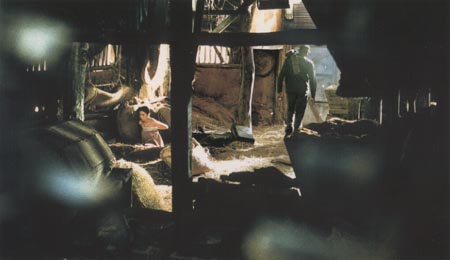
Fifty years after the start of hostilities, the Korean War remains far from being forgotten by those who live on the Korean peninsula. With tens of millions killed, millions of families separated and the country reduced to rubble, the war left a permanent scar on Korea's culture. Indeed, North and South are still technically at war, as a peace treaty has never been signed. Over the years, the medium of film has acted as a key weapon in efforts to interpret and preserve in memory the events of the war, for both the South Korean military government and individual filmmakers with differing agendas. For an overview of the qualities and scope of Korean War films, I have compiled this list as a reference.
A quick introduction to the evolution of Korean War films:
[The 1950s] The Korean War began on June 25, 1950 and continued until 1953. During the war itself there were very few feature films produced; those that were tended to focus on raising morale for the war effort. By 1954 the industry began its recovery with the help of American-donated equipment, and by the late 1950s the film industry was booming. A large number of war films were produced at this time, primarily action films. Piagol (1956) is considered to be the most famous war film of the decade, and one of the classics of Korean film.
[The 1960s] The 1960s witnessed both the Golden Age of Korean film as well as increased interference in the film industry by the military government. A number of films from this period take a more humanist approach, focusing on the tragedies of war. Nonetheless filmmakers were constrained in how far they could go: popular filmmaker Lee Man-hee was arrested in 1965 and his film Seven Women Prisoners was banned for portraying communists in too-positive a light. In this manner the government utilized film as a tool for propagating its own views of the war and preventing alternative viewpoints from reaching the screen. An award was even established as part of the government-sponsored Grand Bell Awards to reward the most strongly anti-communist film of each year.
[The 1970s] The 1970s ushered in an age of much stricter government censorship, and in this environment, film censors indicated a clear preference for certain genres of films, namely: traditional costume dramas, films about adolescence, soft porn, and war films. These war films generally feature a simpler moral framework than the works of the previous decade, and they were crafted chiefly for entertainment purposes.
[The 1980s and 1990s] Most consider the 1980s to be a period of artistic renewal for the Korean film industry. Although censorship remained an issue, several complex and thought-provoking films opened up new, personal perspectives on the war, in particular Bae Chang-ho's Warm Winter was Gone, Im Kwon-taek's Gilsodom, and Lee Jang-ho's The Man with Three Coffins. A gradual loosening of government censorship starting in 1988 allowed filmmakers to cover topics that were previously off-limits, in particular: (1) the fate of leftist partisans from the South who fought for the communist army (Partisans of South Korea; The Taebaek Mountains); (2) critical portrayals of U.S. troop presence in Korea (Silver Stallion; Spring in My Hometown); and (3) sympathetic portrayals of North Korean soldiers (Shiri, Joint Security Area). Although financial pressures have replaced government interference as a key constraint on the filmmaking process, the past two decades have allowed for a more detailed and somewhat more balanced portrait of the war to begin to emerge.
The following is not an exhaustive list, as there were a staggering number of movies made from the 1950s to the 1970s that utilized the war as a backdrop. Instead I have attempted to include the most famous and respected of the Korean War movies, as well as a few of the more conventional films which are largely forgotten today. Unfortunately I do not have access to films from the North, and so I am unable to include them in this reference.
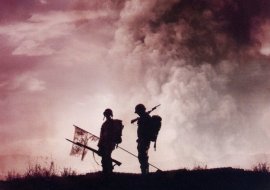 TAEGUKGI (2004) ["Tae-geuk-gi"] dir. Kang Je-gyu. Starring Jang Dong-gun, Won Bin, Lee Eun-ju, Jo Yoon-hee, Gong Hyung-jin, Lee Young-ran. 140 min. World distribution: US, Japan, France, Germany, UK, etc. Available on DVD with English subtitles.
TAEGUKGI (2004) ["Tae-geuk-gi"] dir. Kang Je-gyu. Starring Jang Dong-gun, Won Bin, Lee Eun-ju, Jo Yoon-hee, Gong Hyung-jin, Lee Young-ran. 140 min. World distribution: US, Japan, France, Germany, UK, etc. Available on DVD with English subtitles.
Two brothers are forcibly drafted into the army in the chaotic days after the start of the war. The older and less-educated of the two decides that the only way to secure the discharge of his brother is to win a Medal of Honor. Yet as the war progresses and the tide of the battle turns towards the South, he begins to get caught up in the fighting and the brothers grow estranged. Set a record for the best-selling Korean film of all time with 11.7 million tickets sold.
SILMIDO (2003) ["Silmido"] dir. Kang Woo-suk. Starring Sol Kyung-gu, Ahn Sung-ki, Jeong Jae-young, Im Won-hee, Heo Jun-ho, Kang Shin-il, Kang Sung-jin. 135 min. World distribution: Japan, Hong Kong, etc. Available on DVD with English subtitles.
An assassination attempt on the South Korean president in the late 1960s motivates the South to set up a secret commando unit charged with assassinating the Northern leader Kim Il-sung. The group of recruits undergo intensive, inhuman training and are fashioned into a highly elite fighting force, but as detente sets in during the early 1970s, the group has nothing to do. Based on a true story, and the first Korean film ever to sell 10 million tickets.
ADDRESS UNKNOWN (2001) ["Su-chui-in-bul-myung"] dir. Kim Ki-duk. Starring Yang Dong-keun, Ban Min-jung, Kim Young-min, Jo Je-hyun and Pang Eun-jin. 117 min. World distribution: France, etc. Available on DVD with English subtitles.
A group of adolescents growing up adjacent to a U.S. military base struggle with the continuing legacy of the war. A young girl becomes romantically involved with an American soldier who promises to pay for an operation on her eye. A half-Korean man is despised for his racial background, while his mother continues to write letters to her son's father in the U.S., despite that they all come back stamped "Address Unknown."
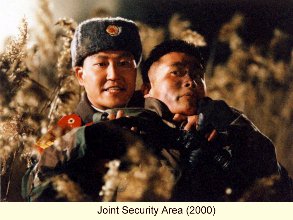 JOINT SECURITY AREA (2000) ["Kong-dong-gyung-bi-gu-yeok JSA"] dir. Park Chan-wook. Starring Lee Young-ae, Song Kang-ho, Lee Byung-hun, Shin Ha-kyun. 107 min. Awards: Best Film, Best Actor, and Audience Prize, 2001 Deauville Asian Film Festival; 1st Runner Up for Best Film at the 2001 Seattle International Film Festival. World distribution: Japan (2001), US (2005). Available on DVD with English subtitles.
JOINT SECURITY AREA (2000) ["Kong-dong-gyung-bi-gu-yeok JSA"] dir. Park Chan-wook. Starring Lee Young-ae, Song Kang-ho, Lee Byung-hun, Shin Ha-kyun. 107 min. Awards: Best Film, Best Actor, and Audience Prize, 2001 Deauville Asian Film Festival; 1st Runner Up for Best Film at the 2001 Seattle International Film Festival. World distribution: Japan (2001), US (2005). Available on DVD with English subtitles.
Set in the present day. Shooting breaks out at the truce village of Panmunjom, leaving two North Korean soldiers dead. With North and South holding widely-diverging views of what happened, the two countries agree to have a neutral Swiss officer conduct an inquiry. Her investigation leads her past a string of false testimony to uncover a secret friendship that existed across the border.
SHIRI (1999) ["Shi-ri"] dir. Kang Jae-gyu. Starring Han Suk-kyu, Choi Min-shik, Kim Yoon-jin, and Song Kang-ho. 124 min. World distribution: U.S. (2001), Hong Kong (1999), Japan (2000), Spain (2000), etc. Available on DVD with English subtitles.
Set a new box office record after selling over 6 million tickets. Set in the present day, a team of North Korean commandoes intercept a high-tech weapon from the South Korean military and make plans to ignite a war. Praised at the time of its release for putting a more human face onto soldiers from the North.
SPRING IN MY HOMETOWN (1998) ["A-reum-da-un Shi-jeol"] dir. Lee Kwangmo. Starring Ahn Sung-ki, Lee In, Bae Yoo-jung, Yoo Oh-sung. 113 min. Awards: Gold Prize, 11th Tokyo Film Festival; Best Film, Best Director, Best Cinematography at 36th Grand Bell Awards. Available on DVD with English subtitles.
Lee Kwangmo's debut feature about life in a small village during the war. Seen mostly through the eyes of a young boy, the film portrays the changes wrought by the war and by the presence of a nearby U.S. military base. The fighting itself remains offscreen throughout the film. In 1998, this became the first Korean film to screen in the Director's Fortnight section at the Cannes Film Festival.
THE TAEBAEK MOUNTAINS (1994) ["T'ae-baek-san-maek"] dir. Im Kwon-taek. Starring Ahn Sung-ki, Kim Myung-gon, Kim Kap-soo, Shin Hyun-june, Oh Jung-hye, Bang Eun-jin. 168 min. Awards: Special Jury Prize, Best Actor (Kim Kap-soo) at 33rd Grand Bell Awards.
Based on a famous and controversial Korean novel by Cho Jeong-rae, this 168-minute epic chronicles a guerilla campaign waged by pro-leftist forces both before and during the war. Based on real events, the film centers around Mt. Jiri in southwestern Korea, which provided a natural refuge for the leftist rebels. Veteran director Im Kwon-taek interweaves the experiences of a wide variety of characters to give a more balanced portrait of the conflict than earlier films made under the military government can provide.
TWO FLAGS (MANMUBANG) (1994) ["Man-mu-bang"] dir. Aum Jong Sun. Starring Chang Dong-hwi, Yoon Jung-hee, Kim Hyung-il. 101 min. Awards: Best Actress (Yoon Jung-hee), Editing at 32nd Grand Bell Awards; Best Film, Miami Film Festival.
A remote mountain cottage near the 38th parallel is caught in the midst of battle. The owner, a woman who lives alone, flies either the flag of the North or the South, depending on which army advances closer. At this time, two men arrive at the cottage and the woman agrees to give them refuge. Her home, however, then becomes the scene of a new kind of struggle.
TO THE STARRY ISLAND (1993) ["Keu Som-ae Ka-go-ship-ta"] dir. Park Kwang-soo. Starring Moon Sung-keun, Ahn Sung-ki, Shim Hye-jin. 101 min.
When a man attempts to bring the body of his father to his native island for burial, the local inhabitants protest angrily and prevent the coffin from coming ashore. Gradually we learn the events that took place on the island during the war, which implicate the recently-deceased father in a crime towards the community. Director Park Kwang-soo has called this work a study of the potential for Korea to heal from its past wounds and achieve reconciliation.
SILVER STALLION (1991) ["Eun-ma-neun O-ji An-neun-da"] dir. Jang Kil-soo. Starring Lee Hye-sook, Kim Bo-yeon, Jun Mu-song, Son Chang-min. 123 min. Awards: Best Actress, Best Screenplay at 15th Montreal Film Festival; Presented at 44th Cannes Film Festival.
A young widow in a rural village is raped by a U.S. soldier from a nearby base. Shunned by the narrowly traditional inhabitants of her village, she and her two young children are driven into poverty. Finally she decides to work at "Texas-Town", a prostitution district that caters to U.S. soldiers, bringing her into direct conflict with her fellow townspeople.
PARTISANS OF SOUTH KOREA (1990) ["Nam-bu-gun"] dir. Chung Ji-young. Alternative title: North Korea's Southern Army. Starring Ahn Sung-ki, Choi Min-soo, Choi Jin-shil, Lee Hye-young. 157 min. Awards: Best Director, Best Actor (Ahn Sung-ki) and Best Supporting Actor (Choi Min-soo) at 11th Blue Dragon (Chungryong) Awards.Available on DVD with English subtitles.
 Lee Tae, a leftist reporter living in South Korea at the outbreak of hostilities, joins a partisan army and participates in guerilla warfare against U.N. and South Korean troops. In the course of fighting he befriends a young poet and falls in love with a former nurse who treats his injury. As the fortunes of the partisans turn for the worse, Lee is forced to struggle for his very survival. Screenplay by director Jang Sun-woo (Lies).
Lee Tae, a leftist reporter living in South Korea at the outbreak of hostilities, joins a partisan army and participates in guerilla warfare against U.N. and South Korean troops. In the course of fighting he befriends a young poet and falls in love with a former nurse who treats his injury. As the fortunes of the partisans turn for the worse, Lee is forced to struggle for his very survival. Screenplay by director Jang Sun-woo (Lies).
THE MAN WITH THREE COFFINS (1987) ["Na-geu-ne-neun Kil-e-seo-do Sui-ji An-neun-da"] dir. Lee Jang-ho. Literal title: "Travelers Don't Rest, Even on the Road." Starring Kim Myong-gon, Lee Bo-hee. 104 min. World distribution: Japan (1988). Presented at 38th Berlin International Film Festival and 2nd Tokyo International Film Festival.
A challenging and beautiful film that weaves together historical traces of the war with native shamanist imagery to portray the experiences of a divided nation. The nurse of a dying company chairman agrees to undertake a journey to the old man's hometown, which is now located 'just to the north or south of the DMZ.' Pursued by henchmen of the old man's son, a politician who does not want word of this leaked to the press, they encounter a man carrying the ashes of his wife. This man seems to bring death upon any women he becomes close to. The war is never in the foreground of this film, however it is a key aspect of its themes.
GILSOTTOM (1986) ["Gil-so-tteum"] dir. Im Kwon-taek. Starring Kim Ji-mi, Shin Sung-il, Han So-ryong, Choi Bul-am. 105 min. World distribution: West Germany (1986), U.S. (1987), Japan (1991). Presented at 36th Berlin Film Festival. Awards: Best Film, Best Actress (Kim Ji-mi) at 24th Grand Bell Awards.
Many families were separated during the war. These separated family members are often unaware if their loved ones are living on the opposite side of the DMZ, or if they live somewhere in the same country. In the mid-1980's, a television-sponsored drive to locate lost family members reunited many families in the South. This film takes place amidst this setting, where a woman travels to Seoul and is reunited with her old lover. The two have since remarried, but they undertake a search together to locate their lost son. Eventually they contact a man who may or may not be their son. They decide to undergo DNA testing to determine their relation, but in the course of their acquaintance, wide gaps in their social status and backgrounds cause tension among the three.
WARM WINTER WAS GONE (1984) ["Keu Hae Kyeo-ur-eun Dda-ddeut-haet-ne"] dir. Bae Chang-ho. Literal title: "That Year's Winter was Warm." Starring Ahn Sung-ki, Lee Mi-sook, Yoo Ji-in, Han Jin-hee. 120 min. Awards: Special Prize at 6th Three Continents Film Festival; Best Actress (Lee Mi-sook) at 23rd Grand Bell Awards.
The story of two sisters who are separated as children during the war. Their various experiences lead them to encounter sharply contrasting fates in the years hence. As their lives intertwine they become acquainted with each other, without realizing their familial ties.
NORTH AND SOUTH (1984) ["Nam-gwa Buk"] dir. Kim Gi. Starring Yoo Young-guk, Kim Man, Won Mi-kyung. 110 min.
A communist general named Jang surrenders to the South at the front line of war. A captain named Lee interrogates Jang, but the general will only agree to talk if efforts are made to locate his wife. Lee investigates and discovers that Jang's lost wife is his own wife, Eun-ah. A remake of the 1965 classic film of the same name.
RAINY DAYS (1979) ["Jang-ma"] dir. Yu Hyun-mok. Starring Lee Dae-geun, Hwang Jung-soon, Kim Seok-hoon, Kim Shin-jae. 114 min. World distribution: Japan (1991). Presented at 4th Sao Paulo International Film Festival.
During the war, a small village is caught in the midst of fighting. A family is torn apart when a son from one side of the family chooses to fight for the North, while one from the other side enlists with the South. Tensions grow between relatives until death causes a rupture in the family. This film, told mostly through the eyes of a young boy, is best remembered for the figure of the grandmother, who achieves a sort of reconciliation at the end by means of a shamanist act. Based on a famous novel by Yoon Heung-gil.
JUN-WOO'S LAST WORDS (1979) ["Jonu-ga Nam-gin Han-madi"] dir. Lee Won-se. Starring Jin Bong-jin, Jang Hyuk, Jun Young-sun. 105 min. World distribution: Asia, Africa (1980).
Peak 598, an important strategic point, is lost 39 times and recaptured 40 times in the course of the war. The North Korean army builds a natural fortress into the mountain, and a special suicide squad from the South is given the task of infiltrating and detonating the base. After numerous difficulties they enter a cave with a 60 degree downward slope, where they leave a time bomb and attempt to escape.
LAST DAY AT MT. DOSOL (1977) ["Dosolsan Ch'oe-hu-ui Nal"] dir. Sol Tae-ho. Starring Hwang Hae, Jang Hyuk, Jin Bong-jin. 118 min. World distribution: Various countries (1979).
Lieutenant Kang's platoon is surrounded by the enemy, but he is saved by the platoon led by his friend Lieutenant Han. Together the two men come across a warehouse and rescue Su-Hyang, who is about to be raped by the enemy. Han falls in love with her, but shortly thereafter his plane crashes and he is taken prisoner by the enemy. Kang, believing his friend to be dead, asks Su-Hyang to marry him. A great battle follows at Mt. Dosol, where Han escapes but is killed by the enemy. Stricken with grief, Su-Hyang enters a convent with the tacit consent of Lt. Kang.
13-YEAR OLD BOY (1974) ["Ship-sam-sae So-nyun"] dir. Shin Sang-ok. Starring Shin Sung-il, Kim Jung-hoon, Na Ha-young. 85 min.
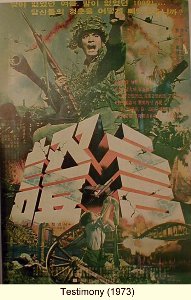 Second Lieutenant Kang, leading a mobile unit during the war, attacks a village to the rear of enemy territory. While there he comes into contact with a 13-year old boy who resists him at first, but eventually becomes his friend. One day Kang's unit comes under serious attack from the enemy, and the boy is hit by enemy fire. Screaming, Kang takes the boy in his arms...
Second Lieutenant Kang, leading a mobile unit during the war, attacks a village to the rear of enemy territory. While there he comes into contact with a 13-year old boy who resists him at first, but eventually becomes his friend. One day Kang's unit comes under serious attack from the enemy, and the boy is hit by enemy fire. Screaming, Kang takes the boy in his arms...
TESTIMONY (1973) ["Jeung On"] dir. Im Kwon-taek. Starring Shin Il-ryung, Kim Chang-sook, Kim Hee-ra. 125 min. World distribution: Hong Kong (1987). Awards: Best Actress (Kim Chang-sook) at the 20th Asian Film Festival.
A feature film shot on a grand scale and given a large release. Second Lieutenant Jang has a date with his girlfriend Sun-ah, when suddenly North Korean bombers attack Seoul on the first day of the war. This film recounts the progression of the war from Sun-ah's perspective.
PRIVATE FIRST CLASS KIM (1969) ["Yuk-gun Kim-il-byung"] dir. Shin Sang-ok. Starring Shin Young-kyun, Choi Eun-hee, Nam Jung-im. Awarded the Editing prize at the 15th Asia-Pacific Film Festival.
Nonsan Training Center receives a new batch of recruits. Among them are Sung-chil from a rural area; a university student Nam-chun; and prospective singer Du-seop. They finish their difficult training and are stationed in the same corps. The film goes on to show the various things they experience in their time together.
MOUNTAIN FIRE (1967) ["San-bul"] dir. Kim Su-yong. Starring Shin Young-kyun, Do Geum-bong. 80 min. Presented at the 17th Berlin Film Festival.
An affair develops between a fugitive Communist soldier and a woman in a remote mountain village. This film is renowned for its erotic tension and fine cinematography, especially in the bamboo groves. From a key figure in 1960s Korean cinema.
MAJOR KANG JAE-GU (1966) ["So-ryung Kang Jae-gu"] dir. Go Yong-nam. Starring Shin Sung-il, Ko Eun-ah. 111 min. World distribution: U.S. (1967). Presented at 5th San Francisco Film Festival.
About a heroic graduate of the Military Academy who saves the lives of his fellow soldiers when a practice drill involving hand grenades goes fatally wrong.
A BRAVE SOLDIER WITHOUT SERIAL NUMBER (1966) ["Kun-bon-eom-neun Yong-sa"] dir. Lee Man-hee. Starring Shin Sung-il, Moon Jeong-suk. 121 min. World distribution: Japan (1967). Winner of Anti-communism Award at 5th Grand Bell Awards, and the Freedom Award at the 13th Asia-Pacific Film Festival.
A tale of two brothers - the older, who commands a flying corps in the Ma Shik Lyeong Mountains; and the younger, an official in the Department of Defense. After denouncing his father as a reactionary, the younger is tormented by guilt, and eventually volunteers to serve in the Air Force under his brother.
A SOLDIER SPEAKS AFTER DEATH (1966) ["Byung-sa-neun Juk-eo-seo Mal-han-da"] dir. Kim Ki-young. Starring Shin Young-kyun. World distribution: Vietnam (1966).
From Kim Ki-young ("Mr. Monster"), the story of a general's son who works as a biologist. Upon being drafted, he gives his collection of flower seeds to his mother. At the front he joins a special attack unit which is ordered to destroy a bridge in enemy territory. After a heroic but costly mission, a cease-fire is called. Back at home, the colorful flowers bloom in his garden.
WAR AND THE WOMAN TEACHER (1966) ["Jeon-jeng-gwa Yeo-gyo-sa"] dir. Im Kwon-taek. Starring Kim Jin-kyu, Eom Aeng-ran. 100 min. World distribution: Southeast Asia (1967).
A documentary based on the story of an elementary school teacher who is left behind enemy lines, unable to retreat. After learning of the movements of the Northern Army, she escapes to the South and informs the army of what she has learned. With this information it becomes possible to repel a Northern attack.
8240 KLO (1966) ["P'al-yi-sa-gong K.L.O"] dir. Chong Jin-woo. Starring Park Am, Nam Gung-won. 113 min. World distribution: Southeast Asia (1966). Awarded Anti-Communism Prize at the 5th Grand Bell Awards.
During the war, the South Korean military receives word that the North is building a massive underground power plant. A special assignment is given to the 8240 K.L.O. military unit to destroy this plant. The members of the unit drop into North Korea, ready to sacrifice their lives to complete the mission.
MARTYR (1965) ["Sun-gyo-ja"] dir. Yu Hyun-mok. Starring Kim Jin-gyu, Nam Gung-won, Chang Dong-hee.
Based on a novel by Korean-American writer Richard Kim (Kim Eun-Kuk), this film centers around both the war and the issue of religion. Fourteen ministers are taken away by Communist troops, and of them only two survive. The film presents the experiences of one of the survivors.
SEVEN WOMEN PRISONERS (1965) ["Ch'il-in-ui Yeo-p'o-ro"] dir. Lee Man-hee. Alternate title: "The Returned Woman Soldier." Starring Moon Jung-sook, Ryu Kyu-sun, Lee Min-ja. After shooting this film, director Lee Man-hee was arrested and his film was banned for portraying Communists in a too-positive light.
A North Korean army officer is placed in charge of seven medical officers who were captured in battle. When Chinese soldiers attempt to rape the women, he feels angry and kills the soldiers. He then leads the nurses to the border and defects to the South along with his men.
INCHON LANDING OPERATION (1965) ["In-ch'on-sang-ryuk-jak-jun"] dir. Cho Gung-ha. Starring Shin Young-kyun, Kim Hye-jung, Yoon Il-bong. World distribution: Southeast Asia (1967).
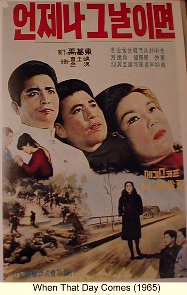
In the midst of the Korean War, a female espionage agent sneaks into a South Korean military unit to obtain information about the UN army. While there she befriends an information officer named Captain Shin, and eventually she falls in love with him. At this point she tells him everything, and provides the military in the North with false information, allowing the UN army to carry out the Inchon landing operation successfully.
WHEN THAT DAY COMES (1965) ["Eon-je-na Keu-nal-i-myun"] dir. Cho Gung-ha. Starring Kim Hye-jung, Park Am. 100 min. World distribution: Japan, U.S. (1967).
The love between a young man and woman is complicated by their social background: she is the daughter of a devoted communist party member, while the other is the son of a feudal landowner. When war breaks out they are separated without any means of communication. The woman eventually crosses into the South and marries another man. Then one day, her old lover returns to her.
NORTH AND SOUTH (1965) ["Nam-gwa Buk"] dir. Kim Ki-duk. Starring Shin Young-kyun, Choi Moo-ryong, Eom Aeng-ran. 114 min. World distribution: Southeast Asia (1965). Awards: Best Tragedy at 12th Asia-Pacific Film Festival. Screened at the 26th Venice Film Festival and the 9th San Francisco Film Festival.
A North Korean captain surrenders to a Southern division in hopes that he can locate his wife, who was separated from him in the midst of war. The commander of the Southern division realizes that the captain's lost wife is now married to him. He agonizes over the situation and finally decides to yield to the captain, volunteering for an assignment in a suicide squad.
DEMILITARIZED ZONE (1965) ["Bi-mu-jang-ji-dae"] dir. Park Sang-ho. Starring Cho Mi-ryung, Nam Gung-won. World distribution: Hong Kong, India, USA (1970). Awards: Best film, 13th Asia-Pacific Film Festival.
A young girl and boy are separated from their mother by the Demilitarized Zone. They decide to cross the border into South Korea, where they face many dangers in their quest to be reunited.
RED MUFFLER (1964) ["Bbal-gan Ma-hu-ra"] dir. Shin Sang-ok. Starring Shin Young-kyun, Choi Eun-hee, Choi Mu-ryong. 100 min. World distribution: various countries (1964). Awards: Best Actor (Shin Young-kyun), Best Director, and Best Editing at the 11th Asia-Pacific Film Festival.
A story of the various air force pilots stationed at Kangneung Air Force Base during the war. Captain Na is a brave pilot with over 100 sorties on his record. A fellow soldier, who has married a bar hostess, dies in the war. A third soldier comforts the widow and begins to fall in love with her.
THE MARINES WHO NEVER RETURNED (1963) ["Tor-a-o-ji An-neun Hae-byung"] dir. Lee Man-hee. Starring Jang Dong-hee, Choi Mu-ryung, Koo Bong-suh, Lee Dae-yeop. 110 min. World distribution: Malaysia, Taipei, USA (1964). Available on DVD with English subtitles.
Follows a group of marines as they adopt an orphaned girl and eventually move to the front for a heroic but costly battle. Focuses on the brutality of war. Considered to be a classic of Korean film.
FIVE MARINES (1961) ["O-in-ui Hae-byung"] dir. Kim Ki-duk. Starring Choi Mu-ryung, Shin Young-kyun, Hwang Hae. 118 min. World distribution: Taiwan (1962).
A commanding officer chooses five marines to form a special attack unit that will infiltrate enemy territory and detonate a powder magazine. The soldiers are successful in their objective, but are discovered by the enemy during their retreat. The debut film of Kim Ki-duk (not to be confused with the contemporary director).
 THE DEFEAT (1956) ["Gyuk-t'oe"] dir. Lee Kang-cheon. Starring Hwang Nam, Choi Bong. 80 min.
THE DEFEAT (1956) ["Gyuk-t'oe"] dir. Lee Kang-cheon. Starring Hwang Nam, Choi Bong. 80 min.
Recounts the real-life adventures of a Major Kim Man-Sul.
PIAGOL (1955) ["Pi-a-gol"] dir. Lee Kang-cheon. Starring Kim Jin-gyu, No Kyung-hee. 110 min.
An anti-communist film which portrays the barbarity of the leftist guerillas who hid themselves on Mt. Jiri during the war. Conflicts arise among the guerillas due to the presence of a female soldier, while another soldier seeks to escape to find his freedom.
THE ATTACK ORDER (1954) ["Ch'ul-gyuk-myung-ryung"] dir. Hong Song-ki. Starring Yeom Mae-ri, Lee Jib-kil, Kim Il-hae. (no longer exists in complete form)
Produced by the Korean Air Force. The first film to portray air combat in the Korean War. Two pilots fall in love with the same woman, and a rivalry develops. When one pilot is shot down by the enemy, however, the other risks his life to save him. Praised for its dynamic, realistic battle scenes.
ARIRANG (1954) ["A-ri-rang"] dir. Lee Gang-chon. Starring Heo Jang Kang, Kim Jae Seon. World distribution: Hong Kong (1957). (no longer exists in complete form)
Borrows narrative elements from Na Un-gyu's classic Arirang (1926), but adapts the film to reflect the situation during the war and the division of Korea into North and South. A family conceals two American soldiers from the occupying forces of the North. A local communist sympathizer discovers the soldiers and threatens to expose them unless the daughter, whom he has always admired, submits to his desire.
THE SONG OF MY HOMETOWN (1954) ["Ko-hyang-ui No-rae"] dir. Yun Bong-chun. Starring Lee Sun-kyung, Kim Shin-jae. Awards: recipient of 4th Seoul City Cultural Award. (no longer exists in complete form)
A young couple is separated by the war, the boy joining the army and the girl, an army nursing unit. They come to love each other more deeply through the hardships of war. After losing his leg in battle, the boy returns to his hometown to help with reconstruction. Director Yun made this film at the end of a long and distinguished career.
SONGBUL TEMPLE (1952) ["Song-bul-sa"] dir. Yun Bong-chun. Starring Yoon Sang-hwa and Lee Bin-hwa in her debut role. (no longer exists in complete form)
A young man wishes to avoid serving in the army, so he takes refuge in a Buddhist temple, claiming to be sick. The chief monk of the temple then persuades him to go back and enter the military. Shot during the war and used to rally support for the war effort.